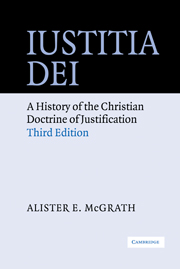Book contents
- Frontmatter
- Contents
- Preface
- List of abbreviations
- 1 Justification: the emergence of a concept
- 2 The Middle Ages: the consolidation of the doctrine
- 3 Protestantism: the Reformation debates on justification
- 4 Catholicism: the Council of Trent on justification
- 5 The modern period
- Glossary of medieval soteriological terms
- Bibliography
- Index
3 - Protestantism: the Reformation debates on justification
Published online by Cambridge University Press: 05 June 2012
- Frontmatter
- Contents
- Preface
- List of abbreviations
- 1 Justification: the emergence of a concept
- 2 The Middle Ages: the consolidation of the doctrine
- 3 Protestantism: the Reformation debates on justification
- 4 Catholicism: the Council of Trent on justification
- 5 The modern period
- Glossary of medieval soteriological terms
- Bibliography
- Index
Summary
The leading principle of the Reformation is generally considered to be its doctrine of justification. While there is unquestionably much truth in this statement, it requires careful modification to do justice to the historical evidence. It is certainly true that the articulus iustificationis is the leading feature of the theology of Martin Luther. It was never, however, accepted within the more radical wing of the Reformation, which stressed the importance of obedience and discipleship, adopting doctrines of grace which stressed human responsibility and accountability towards God, rather than God's transformation of the individual.
Nevertheless, the considerable personal influence of Luther over the majority of the evangelical factions within Germany and elsewhere inevitably led to his personal high estimation of the doctrine of justification being adopted elsewhere, and becoming a determinative and distinctive mark of the mainline Reformation. Thus by the beginning of the seventeenth century the articulus iustificationis appears to have been generally regarded as the articulus stantis et cadentis ecclesiae, the ‘article by which the church stands or falls’.
As will become clear in the present study, however, the origins of the Reformed church seem to owe little, if anything, to Luther's insights into justification. The relation between Luther's own theological insights and the dawn of the Reformation itself is now seen to be a historical question of the utmost complexity, and it must be emphasised that it is no longer possible to assert with any degree of historical or theological precision that the Reformation, considered as a movement, began as a fundamental consequence of Luther's new insights into human justification coram Deo, although it is unquestionably true that Luther's own personal theological preoccupations centred upon this matter.
- Type
- Chapter
- Information
- Iustitia DeiA History of the Christian Doctrine of Justification, pp. 208 - 307Publisher: Cambridge University PressPrint publication year: 2005
- 1
- Cited by



